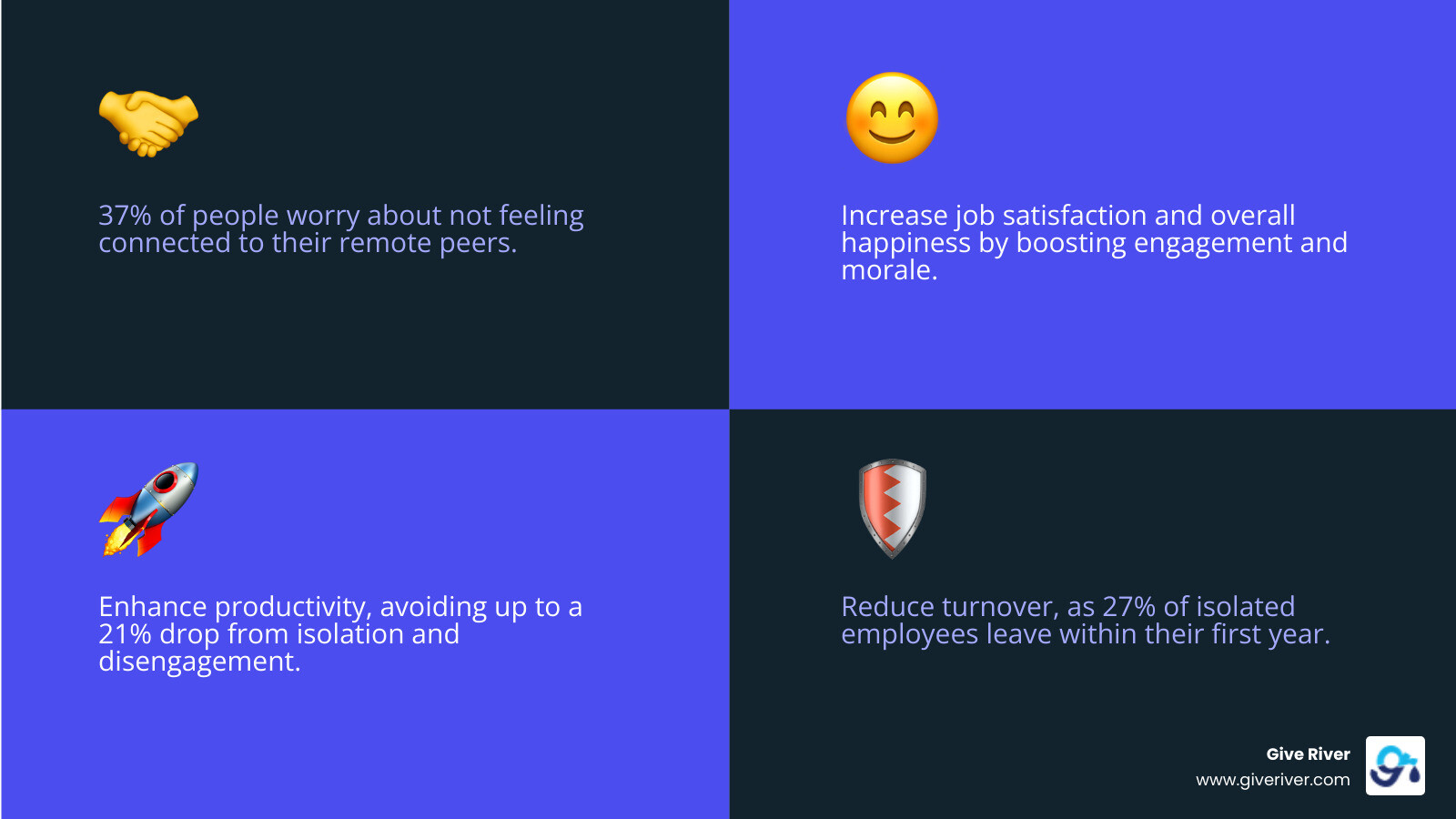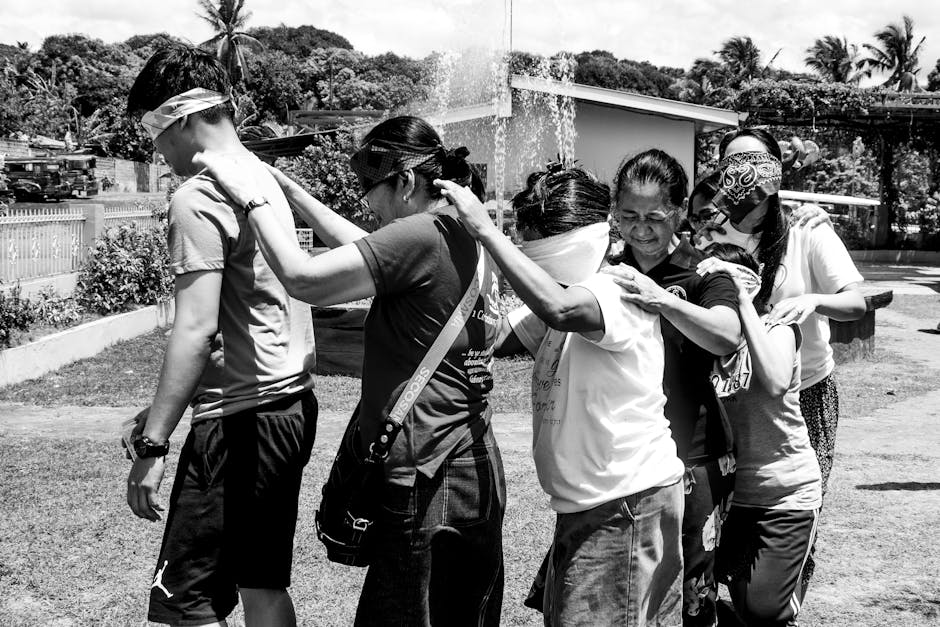Remote Rivalries – Fun Virtual Team Challenge Games to Boost Team Spirit
Boost remote team spirit with fun virtual team challenge games! Discover free & paid options, planning tips, and build a stronger culture.

Why Virtual Team Challenge Games Matter for Remote Teams
In today's evolving workplace, virtual team challenge games are vital for fostering connection and cohesion among remote and hybrid teams. These structured online activities are designed to build relationships, improve communication, and boost morale through playful, gamified challenges.
With 22% of workers still fully remote and many more in hybrid roles, the lack of casual "water cooler" moments can lead to isolation. This disconnection impacts the bottom line, as isolated employees are less productive and more likely to leave. Smart organizations use virtual challenges to intentionally build a thriving culture.
Why are they essential in 2024?
- Combat Isolation: They bridge the physical gap and help team members feel connected.
- Boost Engagement & Morale: Fun, shared experiences increase job satisfaction.
- Improve Communication: Activities are designed to strengthen teamwork and collaboration.
- Reinforce Company Culture: They build trust and a cohesive environment across time zones.
I’m Meghan Calhoun, Co-Founder of Give River. With over two decades in high-pressure environments, I've seen how crucial meaning and joy are, leading me to advocate for engaging virtual team challenge games to transform company culture.

Virtual team challenge games terms you need:
A Guide to the Best Virtual Team Challenge Games & Strategies
The shift to remote work has made us rethink how we connect. Virtual team challenge games are a strategic necessity for maintaining morale, fostering communication, and building a cohesive company culture, no matter where your team is located.
Energizing & Engaging: Top Free Virtual Team Challenges
You don't need a large budget to build connections. Many effective games can be played for free using tools you already have.
- Virtual Scavenger Hunt: Give your team a list of items to find in their homes. This classic game is a great icebreaker that encourages quick thinking and creativity.
- Two Truths and a Lie: Each person shares two true statements and one lie. It’s a simple, powerful way to help team members learn interesting facts about each other and spark conversation.
- Pictionary with Virtual Whiteboard: Use your video conference tool's whiteboard for a fun game of Pictionary. One person draws, and their team guesses, exercising creativity and non-verbal communication.
- "Can You Hear Me Now?": One person describes a random image using only geometric shapes while others try to draw it. It's a fantastic exercise in precise communication and active listening.
- Collaborative Playlist Creation: Team members add songs to a shared playlist based on a theme. This is a great low-pressure, asynchronous activity that reflects the team's diverse tastes.
- Virtual "Show and Tell": Ask team members to share an object that is meaningful to them. This allows colleagues to share personal stories and connect on a deeper level.

Level Up Your Connection: Popular Paid & Hosted Challenges
For a more polished and immersive experience, consider investing in a professionally hosted event. These often come with dedicated facilitators who manage all the logistics.
- Virtual Escape Rooms: Teams work together to solve puzzles and riddles to "escape" a virtual room. They are excellent for developing problem-solving, critical thinking, and collaboration skills under pressure.
- Online Murder Mysteries: Teams gather clues and interview suspects to solve a fictional crime. These games are fantastic for fostering communication, deductive reasoning, and teamwork.
- Virtual Office Olympics: A hosted event where teams compete in a series of spirited, quirky challenges. They inject a healthy dose of competition and fun into the workday.
- Virtual Tasting Experiences: Led by an expert, teams can enjoy a guided tasting of wine, coffee, or chocolate. It's a unique sensory experience that allows for relaxed connection.
- Themed Global Trips: Elaborate app-based games that take teams on a simulated journey around the world, completing tasks and puzzles along the way.
- Customized Workshops: Go beyond games with facilitated workshops on storytelling, DIY crafts, or wellness, focusing on skill-building and shared experiences.
A great facilitator is key for paid events, as they can "set the tone and energize participants," turning a good game into an unforgettable experience.
Choosing Your Challenge: How to Pick the Perfect Game
Selecting the right game is crucial. Consider these factors to ensure maximum engagement:
- Team Size: Small teams suit interactive games like murder mysteries, while larger groups may need scalable activities like trivia or app-based hunts.
- Team Interests: Are they competitive, creative, or social? Survey your team to find what excites them.
- Company Goals: Align the game with your objectives, whether it's improving communication, fostering innovation, or boosting morale.
- Budget: Determine what you can spend. Excellent free and paid options are available.
- Time Zones: For global teams, find activities that can be played asynchronously or at a time that works for most.
- Inclusivity: Ensure the activity is accessible and enjoyable for everyone, considering diverse backgrounds and comfort levels.
- Asynchronous vs. Synchronous: Decide if you want a live event or an ongoing challenge that offers more flexibility.
From Planning to Praise: Overcoming Common Problems
Anticipate common challenges to ensure a smooth and impactful event.
- Low Participation: To combat this, clearly communicate the benefits, involve the team in choosing the activity, and schedule it during work hours to respect personal time.
- Technical Difficulties: Test all platforms beforehand, provide clear instructions, and designate a tech support person to handle any issues.
- Awkward Silence: A skilled facilitator is key to guiding discussion and encouraging participation. Use breakout rooms for larger groups to make it easier for everyone to speak up.
- Including Introverts: Offer various ways to participate, such as chat, polls, or small group discussions, so everyone can contribute comfortably.
- Time Zone Scheduling: For global teams, rotate meeting times or choose asynchronous activities that don't require everyone to be online simultaneously.
- Measuring Impact: Use pre- and post-activity surveys to gauge morale and connection. Hold brief debriefing sessions to gather qualitative feedback.

The ROI of Fun: How virtual team challenge games Build a Stronger Culture
The benefits of these games are a strategic investment in your people, with a tangible return.
- Boosting Morale and Engagement: Fun activities combat burnout and foster a positive work environment, leading to more engaged and productive employees.
- Improving Communication and Collaboration: Games provide a space to practice active listening, clear articulation, and effective teamwork, skills that translate directly to daily work.
- Building Trust and Psychological Safety: Shared experiences, laughter, and friendly competition strengthen bonds and create an environment where individuals feel safe to share ideas and take risks.
- Reinforcing Company Values: Games can be custom to subtly reinforce core values like teamwork, integrity, or innovation.
- Enhancing Productivity and Reducing Turnover: Connected, engaged teams are more productive and have higher job satisfaction, which directly correlates with better retention rates.
By investing in virtual team challenge games, you are strategically cultivating a resilient and vibrant company culture.

Fostering Fulfillment Beyond the Game

While virtual team challenge games create wonderful moments of connection, they are the spark, not the entire fire. To build a truly thriving workplace, you must turn those moments into a lasting culture of fulfillment.
According to Gallup’s annual State of the Global Workplace report, only about 23% of employees worldwide describe themselves as engaged at work—a sobering statistic that underscores why quick team-building wins are no longer enough.
Engagement gets someone to participate in a game; fulfillment makes them excited to tackle Monday's challenges with their team. The key is to move from one-off events to a long-term strategy of continuous engagement.
After the laughter of a virtual game fades, what's next? Successful organizations weave recognition and growth into their daily rhythm. Platforms like Bonusly and Kudos show how peer-to-peer recognition can extend positive moments, but you can go further. At Give River, our unique 5G Method integrates a recognition culture with guidance, wellness content, gamification, and community impact.
This holistic approach transforms fun moments into a sustainable culture of employee fulfillment. The goal isn't just to schedule the next game; it's to create an environment where collaboration and mutual appreciation are the norm. When employees feel this deep fulfillment, they become your organization's greatest advocates.
For more insights on building this kind of lasting team culture, explore our team building solutions and find how the right approach can transform your workplace into a place where people genuinely want to be.




